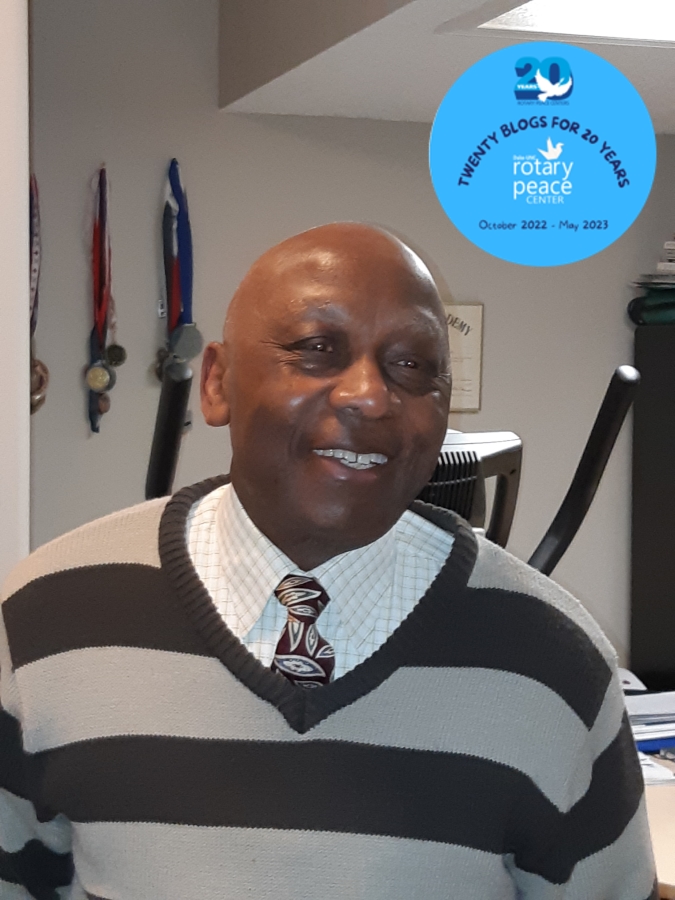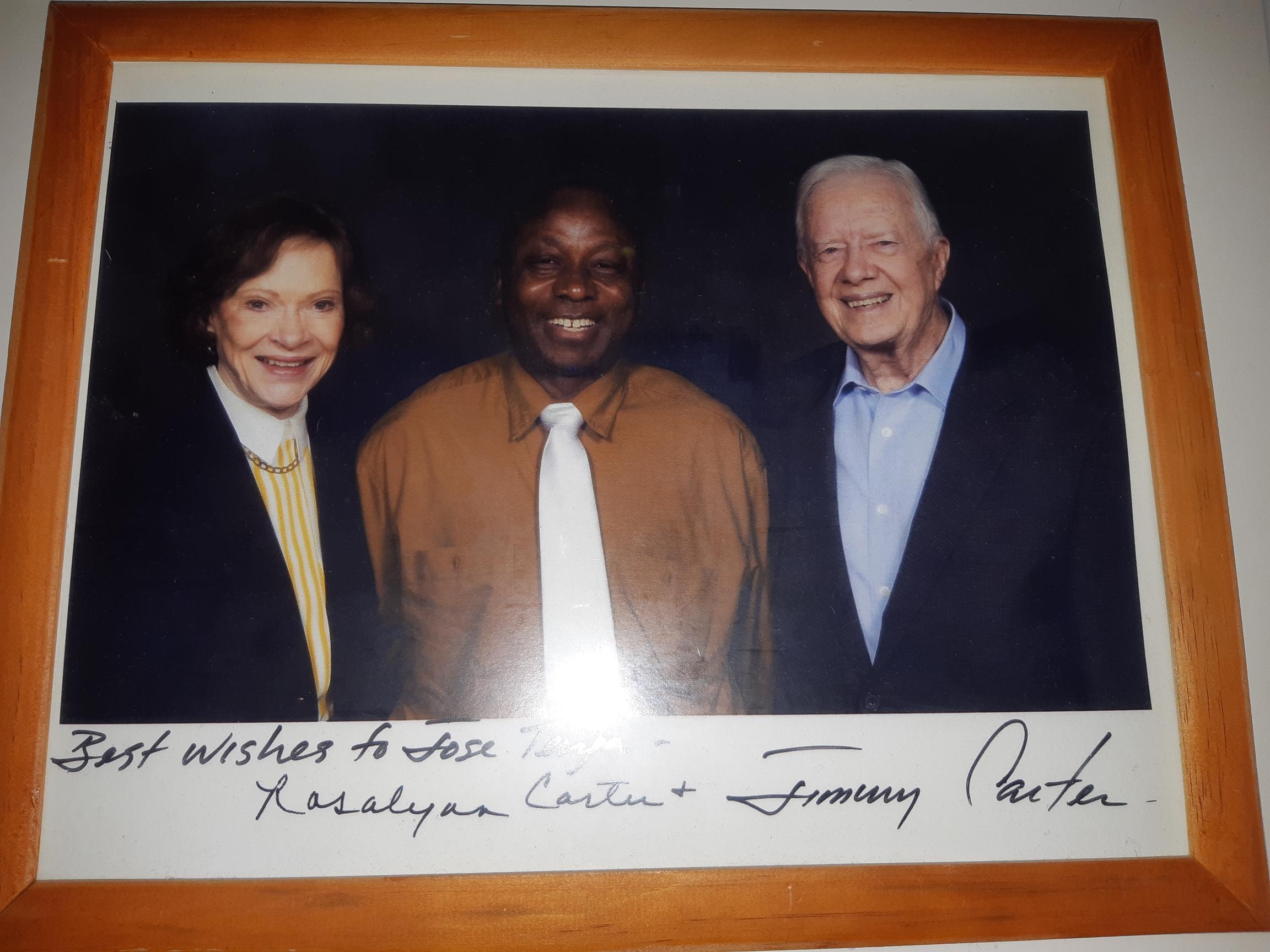Josephus Tenga, Class 3 (2004-2006)
Twenty Blogs for 20 Years
Jose Tenga (MIDP ’06) arrived at Duke University in 2004 with several years of professional and field experience in development and conflict resolution already under his belt. After receiving his degree in Economics from the University of Sierra Leone, he spent several years working in commercial banking before being recruited by UNICEF to help establish the organization’s country office in Sierra Leone. Jose’s volunteer work with UN missions such as UNAMSIL and UNOSOM has taken him to Somalia, Liberia, and areas of conflict within his own country. In this post, he reflects on his experience with these missions, his post-fellowship work with the Carter Center in Atlanta, Georgia, and his current role supporting peace in his local community in Calgary, Canada.
 This week, the airwaves (especially CNN) have been filled with news about the declining health of former U.S. President Jimmy Carter. The 98-year-old former president has been moved to his home in Plains, Georgia, where he will receive hospice care. This could signal the final ride of his long and well-lived life. This news has caused me to reflect on my time working with him at the Carter Center in Atlanta, Georgia from 2008 to 2009.
This week, the airwaves (especially CNN) have been filled with news about the declining health of former U.S. President Jimmy Carter. The 98-year-old former president has been moved to his home in Plains, Georgia, where he will receive hospice care. This could signal the final ride of his long and well-lived life. This news has caused me to reflect on my time working with him at the Carter Center in Atlanta, Georgia from 2008 to 2009.
————————————————-
My time at the Carter Center was busy and fulfilling. At our first meeting, President Carter commented, “Young man, your work is cut-out for you. Conflict is a growth industry, so you would never be out of work”.
As an assistant director in the conflict resolution department and project director for Africa, I had a busy schedule, from serving as a point of contact for visitors from Africa to being the resource-person for new and ongoing initiatives on the continent. The trips to multiple countries in West Africa were special as they presented me with opportunities for up-close meetings with Heads of State and senior political leaders. In Liberia, I met with President Ellen Johnson-Sirleaf and her team; in Cote d’Ivoire, with then presidential candidate Alassane Ouattara (now president) and prime minister Guillaume Soro; in Guinea, I presented a letter from President Carter to military junta leader Musa Dadis-Kamara; in Sierra Leone, I had a long discussion with President Ernest Bai Koroma (a former student colleague at the University of Sierra Leone), vice president Sam Sumana and senior government officials.
These visits brought into sharp focus the challenges facing all four countries, post-conflict, across the full spectrum of human development. It also underlined the importance of the Rotary Peace Fellowship and reminded me of the reason we received the training at Duke-UNC.
————————————————-
My varied hands-on and personal experience in countries in conflict prepared me well for taking on the Rotary Peace Fellowship. From my first United Nations peacekeeping mission in Somalia (UNOSOM), through Angola (UNAVEM), Liberia (UNAMIL), Sierra Leone (UNAMSIL) and Cote d’Ivoire (UNOCI), I had a front-row seat and witnessed the horrors, each experience surpassing the previous one in gruesomeness and sheer violence. The stories of survival from refugees and internally displaced populations were the same. The devastation was evident.
In particular, the Sahara Desert in Darfur in eastern Sudan presented a different challenge of the conflict terrain: hot, frequent dust-storms, land bare of vegetation; unforgiving and full of potential ambush points that would defeat the best military strategists. I accepted an offer from the government of Canada to serve on this assignment to assist with the Darfur peace process as well as restoring peace in Sudan as a whole. UNMIS, the UN Mission in Sudan, UNAMID (Darfur) and UNMISS (South Sudan) were the United Nations Missions with mandates to get the job done.
But there was a catch. When world leaders decided to get rid of Libyan president Moammar Gaddafi, they could not foresee one of the unintended consequences of that campaign. The bombing of Libya by NATO and its allies dislodged the Justice and Equality Movement (JEM) rebels from Gaddafi’s custody. At the request of the African Union, Gaddafi had agreed to host the JEM in order to remove their disruptions to the Darfur peace process. After Gaddafi’s death, the JEM looted heavy weapons from Libya, returned to Darfur across the porous common border and ambushed UN peacekeepers. The death toll was considerable. This NATO campaign significantly undermined the Mission’s accomplishments.
————————————————-
Returning to my family in Canada has always filled me with joy, love and gratitude for their patience and understanding. They are the reason I have pursued my passion in the search for world peace.
I am now a volunteer grant coordinator with the Northern Hills Community Association (NHCA), which is northeast of Calgary, Alberta. Using my expertise in project management and NGO administration, I am presenting high impact projects for the NHCA, to the Rotary Foundation, through the peace incubator initiative. It is in this regard that I have been invited to membership of the Rotary Club of Calgary North (District 5360).
I have also gained my license as a financial professional, working with World Financial Group. The company’s motto is “No family left behind”. They have given me the opportunity to build a business in the financial services industry through education and awareness to individuals, families, and small businesses. I believe that when people are presented with the chance to improve their lives, they not only take hold of it – they transform their lives in ways previously unimaginable. Research has consistently proven that the main cause of violence and abuse in the family is lack of financial resources to meet the needs of households. It is my sincere hope to help build the peace within the community through financial education, beginning at the level of the family.
